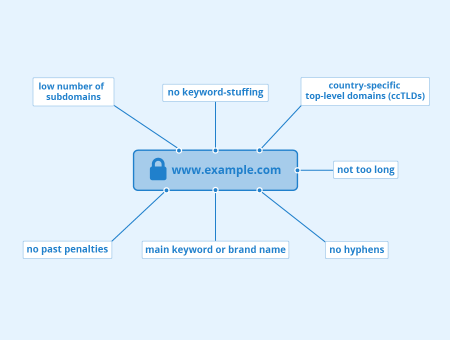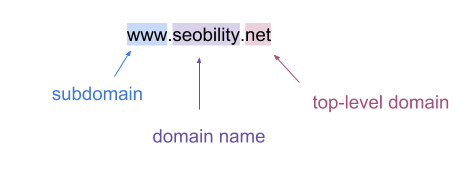Domain for SEO
Contents
How domain names affect SEO
In the early days of search engine optimization, the domain name of a website had a great effect on search engine rankings. At that time it was very easy to achieve high rankings with a domain containing the main keyword. This, however, led to a large number of websites with inferior content being included in the search results, as having a keyword domain was enough to achieve top rankings. As a result, Google now attaches much less weight to the domain name than before. Nevertheless, it is still relevant for SEO and online marketing today, as it can affect your click-through rate in search results, the trust in your website, or facilitate branding (more on this in the next section). Therefore, you should still choose your domain name carefully. Here are some factors you should consider.
Domain SEO Checker
Check if your domain is suitable for SEO
SEO factors to consider when choosing a domain name
Domain extension
You should always use ccTLDs for country-specific content if possible, as these top-level domains signal to Google that your website is especially relevant for country-specific searches, which in turn can improve your rankings.
However, apart from country-specific TLDs, domain endings have no direct influence on SEO and search engine rankings. This also applies to new regional TLDs such as .boston or .melbourne. However, domain endings can have an impact on user behavior, as endings such as .info, for example, are rather clicked in search results when users are looking for information. Thus, your domain ending can indirectly affect the search engine optimization (SEO) of your website.

Since a domain name can only be occupied by one website, it may happen that your desired name is no longer available for a specific TLD. If this is the case, the domain may be available for purchase. But before that, you should check the domain for possible past penalties by Google as well as its age. A domain that has already attracted negative attention from Google certainly provides no good starting point for your SEO.
Hyphens and numbers
Hyphens were once used in domains to separate different words. Today, Google is very good at identifying individual words of a domain, so using hyphens in domain names is no longer necessary. In addition, too many hyphens can quickly look dubious, as they are reminiscent of domains in which many keywords are strung together and separated by hyphens. Basically, you should always own your desired domain with and without hyphens if it consists of several words. Otherwise, there is a risk that one of these versions will be acquired by a competitor or a domain broker. This, in turn, bears the risk that activities on the other version of the domain negatively affect the image of your website.
Using numbers in your domain name can be a good alternative if your main keyword alone is no longer available. In some cases, including numbers can also strengthen your website's brand.
Keywords
Basically, it can help to include your main SEO keyword in your domain (for example, www.hotels.com), since this can improve your ranking in search results (even if Google attaches less weight to keyword domains than in the past). However, you should avoid keyword stuffing, e.g. domains like www.cheap-legaladvice-newyork-lawyer.com. Such domains are not only penalized by Google but also look shady and may damage your brand. If you already have a strong brand, you don't have to use keywords in your domain as a strong and unique brand already contributes positively to your ranking in search results. But for companies that still need to position and establish their brand in the market through SEO, it can be helpful to use the main keyword in their domain name.
Meaningful name
For those companies that don't have a strong brand name, it is also advisable to choose a meaningful domain name that meets the search intent of users. If your domain name provides information about what users will find on your website and if this meets their expectations, you can increase your click-through rate in the search results.
The disadvantage of such domain names, however, is that if you want to expand your product portfolio in the future, they may no longer be able to cover its full bandwidth. Therefore, your domain name should not be too specific, if you can’t rule out future expansions.
Short domain name
Another important SEO aspect to consider when choosing a domain is its length. Your domain name should be as short as possible because otherwise, it is harder to read and to remember. An optimal length would be about 8 characters. Of course, this length is not mandatory, because depending on your website, the optimal length for SEO can be quite different. Always keep in mind that the main factor to consider when choosing a domain name should be your users, not search engines like Google and SEO. Therefore it should be as short and simple as possible.
Not too many subdomains
Subdomains are a good way to keep certain content (e.g. a blog) separate from your actual website. However, this technique generates many different websites. If there are too many subdomains, your website runs the risk of being classified as subdomain spamming. Therefore, you should keep the number of subdomains as low as possible for SEO purposes.
Background information: What is a domain?
The domain of a website is what we refer to as a “web address” in everyday language. It’s a translation of an IP address into words, making it more memorable and user-friendly than a long string of numbers.
Each existing domain can only be assigned to one website and is therefore unique. However, the term domain should not be confused with the term URL, as a domain is only part of an entire URL.
A domain consists of the following components: top-level domain (TLD), domain name, and subdomain.

Figure: components of a domain, Author: Seobility
- Top-level domain: A TLD is also called domain extension and can be country-specific (ccTLD, eg .us, .de, ...) or generic (gTLD, eg .com, .net, .info, ...). In addition, there have been so-called new TLDs (nTLD, e.g., .boston or .photography) for some time now which allow a more differentiated geographic or thematic classification of your website.
- Domain name: This is the unique name of a website, e.g. the company name. It can be chosen as needed and represents the unique part of a domain. Apart from hyphens, no special characters are allowed. The domain must not begin or end with a hyphen.
- Subdomain: Subdomains can be used for specific areas of a website that should be separated from the actual site, such as "mobile" or "blog". The most common subdomain is www, which stands for world wide web. Despite its omnipresence, you don’t necessarily have to enter it into your browser in order to access a website.
Related links
- https://www.searchenginejournal.com/how-to-choose-domain-name/252285/
- https://www.webpopdesign.com/choose-domain-name/
- https://digitalmarketingmind.com/best-domain-registrars/
- https://bloggerspassion.com/blog-names/
Similar articles
| About the author |
 |